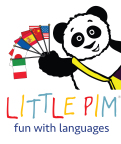 Little Pim the Panda has a series of videos that are part of an ‘Entertainment Immersion Method’ which uses animation to help children learn new vocabulary, and improve analytical, memory and concentration skills in 11 languages. Children can learn over 360 words and phrases using all of the Little Pim lessons. Now OLPC is partnering with them to bring language learning to millions of students with XOs around the world.
Little Pim the Panda has a series of videos that are part of an ‘Entertainment Immersion Method’ which uses animation to help children learn new vocabulary, and improve analytical, memory and concentration skills in 11 languages. Children can learn over 360 words and phrases using all of the Little Pim lessons. Now OLPC is partnering with them to bring language learning to millions of students with XOs around the world.
Rodrigo said of the partnership, “We are delighted to join forces with Little Pim to make learning language more fun for children. OLPC and Little Pim share a common philosophy that learning should be a joyous experience and that children learn best when learning and play are seamless activities.â€Â Julia Pimsleur Levine, CEO of Little Pim, said: “We are thrilled to partner with OLPC and help bring Little Pim content to millions of bright young minds around the world.â€




